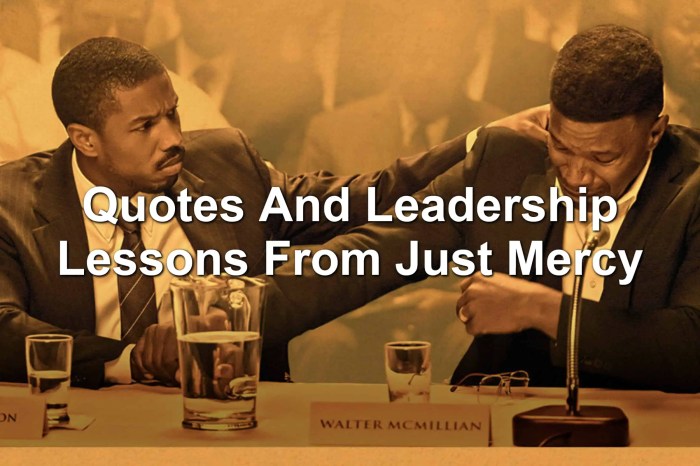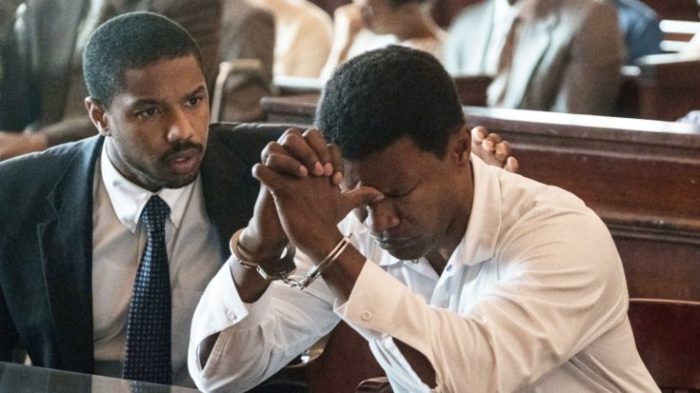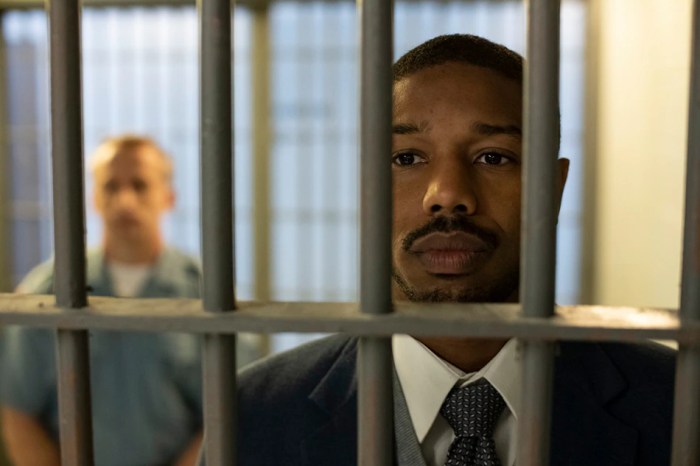In the realm of criminal justice, the concept of mercy holds profound significance. As we delve into “Important Quotes in Just Mercy,” we’ll explore the compelling insights of Bryan Stevenson’s renowned work, examining how mercy can foster rehabilitation, challenge inequality, and ignite personal transformations.
From the halls of the courtroom to the depths of human experience, this exploration will illuminate the multifaceted nature of mercy and its profound impact on individuals and society as a whole.
The Importance of Mercy

Mercy plays a pivotal role in the criminal justice system by offering a path toward redemption and rehabilitation for individuals who have committed crimes. It recognizes that individuals are capable of change and deserve an opportunity to rebuild their lives.
Mercy promotes rehabilitation by fostering a sense of hope and self-worth in those who have been incarcerated. It encourages them to believe that they can overcome their past mistakes and become productive members of society. Studies have shown that individuals who receive mercy are less likely to reoffend, as they feel a sense of gratitude and responsibility to make amends for their actions.
Real-Life Examples of Mercy
- In 2014, President Obama commuted the sentence of Alice Marie Johnson, a first-time drug offender who had been serving a life sentence without parole. Johnson’s case gained national attention, and her release was seen as an act of mercy that recognized the excessive nature of her punishment.
- In 2018, the state of California passed Proposition 64, which reduced penalties for nonviolent drug offenses. This measure was supported by a coalition of criminal justice reformers and advocates who argued that it would promote rehabilitation and reduce recidivism.
Notable Quotes on Mercy from “Just Mercy”: Important Quotes In Just Mercy

Bryan Stevenson’s “Just Mercy” is a powerful and thought-provoking work that explores the themes of mercy, justice, and redemption. Throughout the book, Stevenson includes numerous quotes that underscore the importance of mercy and its transformative power.
The Importance of Extending Mercy to All
One of the most memorable quotes in “Just Mercy” is:
“Mercy is for the undeserving. If it were only for the deserving, it would not be mercy.”
This quote emphasizes the fundamental principle of mercy, which is to extend compassion and forgiveness even to those who may not deserve it. Stevenson argues that true mercy is not based on merit or worthiness but on the belief that all human beings have the capacity for redemption.
Mercy as a Path to Healing and Reconciliation
Another powerful quote from the book is:
“Mercy is not about condoning evil or excusing harm. It is about recognizing that we are all capable of making mistakes and that we all deserve a chance to redeem ourselves.”
This quote highlights the transformative power of mercy. By extending mercy to others, we create the possibility for healing and reconciliation. Mercy allows us to move beyond the cycle of retribution and violence and to build a more just and compassionate society.
The Importance of Empathy and Understanding
Stevenson also emphasizes the importance of empathy and understanding in the pursuit of mercy. He writes:
“We cannot truly extend mercy until we understand the pain and suffering of others. We must walk in their shoes and try to see the world from their perspective.”
This quote reminds us that mercy is not merely an abstract concept but a practice that requires us to connect with others on a human level. By understanding the experiences and challenges faced by others, we can better appreciate their need for compassion and forgiveness.
Mercy as a Source of Hope and Renewal, Important quotes in just mercy
Finally, Stevenson concludes the book with a powerful quote that encapsulates the transformative power of mercy:
“Mercy is not a sign of weakness. It is a sign of strength. It is the strength to forgive, the strength to love, and the strength to hope.”
This quote emphasizes that mercy is not a passive or sentimental emotion but a powerful force that can bring about profound change. By embracing mercy, we not only extend compassion to others but also find hope and renewal within ourselves.
The Impact of Mercy on Individuals

Mercy can have a profound transformative impact on individuals who have been incarcerated. It can help them rebuild their lives, overcome adversity, and achieve their full potential.
One of the most important benefits of mercy is that it can help to break the cycle of crime. When people are shown mercy, they are more likely to see themselves as capable of change and to believe that they can make a positive contribution to society.
This can lead them to make better choices and to stay out of trouble in the future.
Mercy can also help to heal the wounds of the past. Many people who have been incarcerated have experienced trauma and abuse. Mercy can help them to process these experiences and to move on with their lives. It can also help to restore their faith in humanity and to believe that they are worthy of a second chance.
Stories of Mercy
There are many stories of how mercy has helped people to rebuild their lives. One such story is the story of Anthony Ray Hinton. Hinton was wrongly convicted of murder and spent 30 years on death row. During his time in prison, he never gave up hope.
Bryan Stevenson’s “Just Mercy” contains powerful quotes that inspire and challenge. Words like “compassion” and “reconciliation” resonate deeply. If you seek more words with a similar ending, explore our list of words with sion at the end . These words can help you express important ideas related to justice and mercy, as depicted in “Just Mercy.”
He continued to fight for his innocence and to believe that one day he would be free.
In 2015, Hinton’s conviction was finally overturned, and he was released from prison. He was 58 years old. Since his release, Hinton has dedicated his life to helping others who have been wrongly convicted. He has also become a powerful advocate for criminal justice reform.
Hinton’s story is a testament to the power of mercy. It shows that even after experiencing the worst that life has to offer, it is possible to rebuild and to find hope.
Psychological and Emotional Benefits of Mercy
In addition to the practical benefits of mercy, there are also a number of psychological and emotional benefits. Mercy can help to reduce stress, anxiety, and depression. It can also help to improve sleep and overall well-being.
One study found that people who were shown mercy were more likely to experience positive emotions, such as gratitude and hope. They were also more likely to have a sense of purpose and to believe that they could make a difference in the world.
The Role of Mercy in Social Justice

Mercy plays a crucial role in social justice by challenging systemic inequality and fostering a more equitable society. It recognizes the complexities of human nature, offering compassion and understanding even to those who have committed offenses.
Mercy can challenge mass incarceration and harsh sentencing practices that disproportionately affect marginalized communities. It advocates for restorative justice approaches that prioritize rehabilitation over punishment, reducing recidivism and promoting community healing.
Organizations Incorporating Mercy into Social Justice Efforts
- The Equal Justice Initiative (EJI): EJI provides legal representation to individuals who have been wrongly convicted or unfairly sentenced, focusing on cases involving poverty, race, and gender.
- The Vera Institute of Justice: Vera develops and implements innovative justice reforms, advocating for alternatives to incarceration, bail reform, and fair sentencing practices.
- The National Association for the Advancement of Colored People (NAACP): NAACP works to dismantle systemic racism and promote social justice, including advocating for criminal justice reform and equal protection under the law.
Top FAQs
What is the central message of “Just Mercy”?
The book emphasizes the importance of mercy in the criminal justice system, advocating for compassion, rehabilitation, and a reduction in mass incarceration.
How does mercy contribute to rehabilitation?
Mercy offers individuals a chance to rebuild their lives, break the cycle of recidivism, and reintegrate into society as productive members.
What is the role of mercy in promoting social justice?
Mercy challenges systemic inequality by recognizing the humanity of all individuals, regardless of their past mistakes, and working towards a more just and equitable society.